Unrelated randomness, found online, for a Sunday.
This is an angry bird, as seen in the wild.
This is a 6 bit digital adding machine made of wood.
Interesting.
Unrelated randomness, found online, for a Sunday.
This is an angry bird, as seen in the wild.
This is a 6 bit digital adding machine made of wood.
Interesting.
I'm not necessarily deeply impressed by the social movements currently happening, that are going by monikers prefixed with the word "Occupy" – e.g. Occupy Wall Street. Rather than be critical of the lack of a clear program or set of demands, however, I'd rather be critical of the evident lack of clearheaded, genuine, scientific-spirited analysis. This is not just lacking on the left, though. It's just as lacking in anything on the right, of course. If not more so. Apparently no one has a monopoly on muddleheadedness.
Here is an interesting fact I found recently. I saw a pointer to a review of a recent book called The Spirit Level: Why Greater Equality Makes Societies Stronger, by Richard Wilkinson and Kate Pickett. I read the review and was impresed. At some point, I may work to acquire the book – perhaps I'll see it out on a table at Kyobo Mungo or another Korean bookstore with a good English book section. This happened with another book I recently started, called 23 Things They Don't Tell You About Capitalism, by Cambridge University heterodox economist (and coincidental Korean) Ha-joon Chang.
The above mentioned review led me to a list on the wikithing about something called the Wealth Gini. Roughly speaking, the wealth Gini is a ranking of countries in the world by the "fairness" (equality) of their relative distribution of weatlh (not GDP or income, which I find less compelling). Saliently, South Korea is fourth from the top (Japan is the top), while the USA is fifth from the bottom (Namibia is the bottom).
What do these facts mean?
Eloquent blogic ranter "Who is IOZ" captures some of my feelings (eloquently, of course) with a recent post entitled Costaguana.
I am really enjoying the United States these days. It has come more and more to resemble the sort of tawdry, ramshackle, sweaty, tumbledown, corrupt Greeneland that it was always destined to be–or that it always was but managed to hide behind a mountain of dollar-menu burger patties and tip-hazard SUVs. Well, it sort of sucks to live in a decrepit police state, but at least it finally feels a little more like a real country: demonstrators, work stoppages, tent cities, felonious oligarchs helicoptering to-and-fro, private security firms, a hapless and yet still terrifying apparatus of state repression. A fat cop on the edge of cardiac arrest swinging a knightstick fruitlessly at a dirty kid. Forever.
Amen.
I remain ever-more-happily self-exiled.
Legomaniac nurtures a secret hippy soul. Item in evidence #1 (received via email advertising circular from Lego Corporation – yes, I’m a subscriber):
 If you like maps and killing time online, I highly recommend a site I’ve found called Radical Cartography. I spent way too much time yesterday killing time surfing the various maps and graphs on the site. It’s like when I used to “read” atlases as a kid. Here’s one of Chicago’s ethnic geography that was very interesting.
If you like maps and killing time online, I highly recommend a site I’ve found called Radical Cartography. I spent way too much time yesterday killing time surfing the various maps and graphs on the site. It’s like when I used to “read” atlases as a kid. Here’s one of Chicago’s ethnic geography that was very interesting.
The website also presents some more abstract, or experimental “maps” or even things that might fit better into the category of experimental “art.” Below:
Terry Atkinson & Michael Baldwin, 1967 "Map of a thirty-six square mile surface area of the Pacific Ocean west of Oahu" "Scale 3 Inches : 1 mile"
A blogger named Christopher Carr (at a site called League of Ordinary Gentlemen – a blog name that I somewhat dislike, by the way, because citing it makes me feel like I’m on a street corner handing out ads for a strip club) is refuting some ideas he ran across on another blog by someone named Dr Helen. The level of writing and the way he manages the ideas is spectacular.
He uses the term “scrooge mcduckery” to describe the sort of wannabe-John-Galtism that seems to underlie some portion of the teapartiers. Here’s a great extended quote from the specific blog entry:
Going through the comments over there at Dr. Helen’s and measuring the levels of entitlement, uncompromising self-righteousness, baseless notions of victimhood, and B-team Scrooge McDuckery might be an appropriate exercise for Introduction to Physics students. As if the baby boomers haven’t already been doing this in spirit for years, advocates of going Galt suggest the appropriate response to the democratic government not doing exactly what you-the-one-citizen-among-many like is to sit back and be pampered, as if the baby boomers haven’t already been doing this in spirit for years.
 Actually it’s all a sort of prologue to a paean to Victor Hugo and Les Miserables, and, having never been much of a fan of Hugo, myself, I stopped reading it. But the introductory part really captures quite well a lot of what’s caused me, in recent years, to turn rather leftward from my earlier infatuation with Ayn Randian ideations.
Actually it’s all a sort of prologue to a paean to Victor Hugo and Les Miserables, and, having never been much of a fan of Hugo, myself, I stopped reading it. But the introductory part really captures quite well a lot of what’s caused me, in recent years, to turn rather leftward from my earlier infatuation with Ayn Randian ideations.
Even five years ago I still happily described myself as having strong libertarian tendencies, but I’ve become so uncomfortable with these tendencies in recent times that I cannot in good conscience use the word libertarian any more – at least about myself, anyway. Perhaps these years in communitarian Korea, where even the hard-right conservatives still believe in things like universal healthcare and massive government-funded infrastructure projects, has colored my worldview.
I’m not really going anywhere with this, but I so loved Carr’s use of the term “scrooge mcduckery” (and by the way, I loved Scrooge McDuck comics when I a kid – why?). So I had to post this comment.
Today is Korean Thanksgiving (Chuseok). I went on a walk. The city is more shut down than Mexico City on Superbowl Sunday (which, contrary to preconceptions, is the most shut-down I ever saw that city).
Hurry, hurry, everyone. Go to your home town, and propitiate some ancestors.
Maybe you can google them first, and find out what they need – google presented a chuseok-themed googledoodle today.
Ok, bye. Happy Holiday.
I have decided to call the obsessive tendency in the media to discuss, memorialize and analyze the events of 9/11 on the anniversary of that event nineelevenism. I’m seeing way too much of it – on the English language websites I visit, on English language streaming radio I listen to.
I’m sick of it. I remember that day vividly. I was working in the office in Burbank. Somebody got some still pictures of it on their computer, and somebody turned on the radio. Then one of the bosses had a television on. I made an utterly inappropriate joke, very dark-humor, about disgruntled architecture critics – “those buildings were always so ugly.” Which I believed. I’ve always felt guilty for having made such an insensitive, inappropriate remark, before having realized the magnitude of the situation. I bear it like a little secret stain, a stolen moment of schadenfreude. Yet…
By the second day, I already saw the over-reaction taking shape. Yes, 3000+ people is a lot. But compared to wars and famines going on around the world at that time…
I wonder what date it was that the number of innocent, civilian lives taken by US / “coalition” forces exceeded the number of those lost on September, 11, 2001? I’m not talking about the lives of those who plotted, who combatted, who terrorized. I talking only about the collaterals. I’ve read statistcs that, between Iraq and Afghanistan, the number of collateral lives lost is in the hundreds of thousands. That seems plausible… and deeply inappropriate for a supposedly civilized nation to be implicated in.
I am not a pacifist. But this just isn’t the right thing to do. It wasn’t, not at any point.
By the end of the first year, I felt despair. I took to citing Luke 6:27-31 to people ranting on justice and vengeance – not because I am Christian, but because they claim to be.
27 ¶ But I say unto you which hear, Love your enemies, do good to them which hate you,
28 Bless them that curse you, and pray for them which despitefully use you.
29 And unto him that smiteth thee on the one cheek offer also the other; and him that taketh away thy cloke forbid not to take thy coat also.
30 Give to every man that asketh of thee; and of him that taketh away thy goods ask them not again.
31 And as ye would that men should do to you, do ye also to them likewise.
The iconic image above (which I probably shouldn’t reproduce but I can’t resist) had an interesting write up in the Guardian recently. People love to rant about how inappropriate the mood of the photo is – this idyllic late summer scene, the smoke in the background. But this is humanity. Life goes on.
Look for beauty, don’t dwell on suffering. Seeking vengeance will rot your heart long before it destroys any enemy.
Sullyblog talks about one of my pet subjects, density, and posts this amazing little video. Too awesome not to share.
Lilium Urbanus from Joji Tsuruga on Vimeo.
In an entirely implicit way, the video demonstrates the underlying organicity of cities. Plus, how cool is it, to imagine a city shaped like a flower? Samsung Engineering could build it – probably in some oil-statelets back yard.
The best remake of Star Wars, imaginable. It’s called Star Wars, Uncut. The conceit is that they chopped the entire movie into 15 second chunks, and then “crowdsourced” youtube-like remakes of each individual clip. Then it’s all strung together back into the movie, again. Phenomenal: funny, insightful, satiric, intelligent, banal. I can’t embed it, but go to the website, and check it out. A screenshot.
The humor in this picture I found online is very geeky, very inside-jokey, but it made me laugh out loud. Do you see it? It’s pretty subtle. If you see it, you’re a geek. If you laugh, you’re a nerd, too.
I was really exhausted after work yesterday. We’re getting a lot of new students, which is a typical part of the hagwon business cycle, since it’s summer vacation and parents are looking for ways to offload their kids – what better way than to enroll them in a hagwon or three? But anyway… I don’t have much to say. New students are a lot of work, mostly because of the shambolic curriculum, meaning that each new student requires a great deal of photocopying of materials and “catch-up” counselling. One thing I really appreciated at LBridge, in retrospect, was how smoothly incoming students were integrated into the tightly programmed curriculum. Because all the teachers followed the same texts, in the same pattern, on a published (via website) schedule, new students and the intake (front-desk) people could find out where the student should be and what materials they needed before they even came to class. Often, kids would show up for their first class already having done the homework, even.
OK – it’s easy to wax nostalgic for previous experiences – there were things that made LBridge a terrible place to work, too. So each place has its positives and negatives, right? I’m going through one of those inadequate-feeling phases with work, I suppose.
I was watching Colbert, thought this was very funny: he’s interviewing “Ham Rove” – a stand-in for Karl Rove. Note that’s a Sauron figurine behind Ham Rove to the far right. I think Sauron is Obama. Colbert definitely has his funny moments.
Returning, once again, to the theme of densities and cities and sustainability, I saw the following TED video (if you’re not familiar with TED, it’s worth going and looking around). I’ll let the guy do the talking.
[UPDATE: the link to the TED talk rotted… and I don’t even know what the title was. It’s unrecoverable knowledge. Yay, internet!]
What I’m listening to right now.
오승근, “떠나는 님아.”
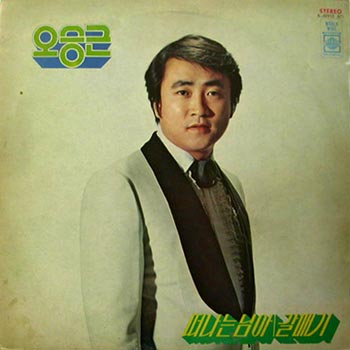 I was listening to my mp3s on shuffle, and this song came around. I genuinely like it a lot. It’s 떠나는 님아 by 오승근 [Oh Seung Geun]. “떠나는 님아” [tteonaneun nima] means “O departing beloved…” – my intuition is that this is rather archaic Korean, which is of course quite appropriate for an old folksong. It took me a while to work out what seemed like an appropriate translation for the title. I won’t even attempt the lyrics, below.
I was listening to my mp3s on shuffle, and this song came around. I genuinely like it a lot. It’s 떠나는 님아 by 오승근 [Oh Seung Geun]. “떠나는 님아” [tteonaneun nima] means “O departing beloved…” – my intuition is that this is rather archaic Korean, which is of course quite appropriate for an old folksong. It took me a while to work out what seemed like an appropriate translation for the title. I won’t even attempt the lyrics, below.
This song wasn’t easy to find a video for – the only material available on youtube consists of noraebang (karaoke room) voice-overs. I was about to give up in despair (and/or make my own) when I found the above video on youku.com (a Chinese youtube-type site). [UPDATE: I found a Korean version, which is now what’s embedded.]
One shouldn’t be surprised to find Korean language material on Chinese websites – there are millions (maybe 5 million, conservatively) of Koreans living in China, including an autonomous region in the far Northeast, bordering North Korea and Russia’s Primorskiye, where Korean is the official language. I suspect the reason I had to go to China to find a video is due to copyright issues – the Koreans are pretty lax enforcing the copyrights of other countries, but work at it assiduously when it comes to their own cultural content.
Here are the lyrics.
오승근 – “떠나는 님아”
가려거든 울지말아요 울려거든 가지말아요
그리워 못보내는 님 못잊어 못보내는 님
당신이 떠나고나면 미움이 그치겠지만
당신을 보내고나면 사랑도 끝이난다오
님아 못잊을 님아 님아 떠나는 님아
두눈에 가득 이슬이맺혀 떠나는 나의님아
가려거든 울지말아요 울려거든 가지말아요
그리워 못보내는 님 못잊어 못보내는 님
님아 못잊을 님아 님아 떠나는 님아
두눈에 가득 이슬이맺혀 떠나는 나의님아
가려거든 울지말아요 울려거든 가지말아요
그리워 못보내는 님 못잊어 못보내는 님
못잊어 못보내는님.
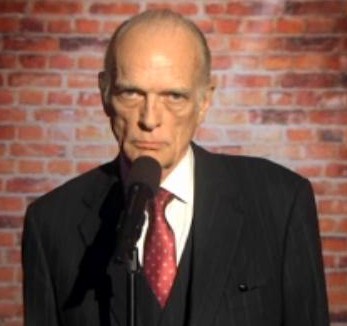 “What is the nature of Grape-Nuts? They are neither grapes nor nuts. And so, the sad farce continues.” – Hans Beinholt, German Ambassador to the United Nations.
“What is the nature of Grape-Nuts? They are neither grapes nor nuts. And so, the sad farce continues.” – Hans Beinholt, German Ambassador to the United Nations.
Really, he said this. He was visiting the Colbert Report, on July 11th, and doing stand-up comedy. Apparently, he’s done this before. I thought he was very funny, in a kind of dark, nihilistic way.
Embedded below is the clip from the Colbert Report that includes his routine – it’s pretty short. It starts at around 3:15 in the clip. [UPDATE: The original link rotted, but I found the German’s part as a youtube post.]
I laughed at all his jokes.
What I’m listening to right now.
Les Mains Ensorcelées, “Sur le quai.”
The video animation is awesome. It’s a French group, also known by the English version of their name, The Bewitched Hands. I was unable to find the lyrics to this.
What I’m listening to right now.
Blockhead, “The Music Scene.”
Mostly, I post these youtubes because I want to share the music. Often, the video is irrelevant, or at the least, kind of boring. But in the above, the video is the awesome, main deal. I blame Chris Bodemer at Sullyblog (which is just my way of saying: “hat tip” – that’s where I ran across the video).
Perhaps one reason I often feel so deeply annoyed with foreigners in Korea who rant on and on about all the things wrong with present-day Korea is that it shows such a striking lack of historical perspective. Do they have any idea of where this country came from? Of what it’s been through? I recently came across some amazing photos taken by a U.S. soldier who was stationed here in the 1960’s. Please… please go look at them.
 My own historical perspective is perhaps provided by the fact that I was here as a soldier, myself, in 1991. And the change in this country – even from that time – until now is stunning to behold. Imagine taking the Korea shown in those photographs, linked above (and sample at right), and the Korea of today, and finding the half-way point – the average of them… the transition. That’s what I was seeing when I was here in 91. South Korea in 1955, in the aftermath of the war, was one of the poorest countries on earth. Poorer than Haiti, for example. In 1991, Korea was still about the same level as, say, Mexico. I think one reason I “connected” with Korea in 91 was because of all the weird similarities, cultural and socio-economic and political, that I perceived between this country and my beloved, benighted Mexico.
My own historical perspective is perhaps provided by the fact that I was here as a soldier, myself, in 1991. And the change in this country – even from that time – until now is stunning to behold. Imagine taking the Korea shown in those photographs, linked above (and sample at right), and the Korea of today, and finding the half-way point – the average of them… the transition. That’s what I was seeing when I was here in 91. South Korea in 1955, in the aftermath of the war, was one of the poorest countries on earth. Poorer than Haiti, for example. In 1991, Korea was still about the same level as, say, Mexico. I think one reason I “connected” with Korea in 91 was because of all the weird similarities, cultural and socio-economic and political, that I perceived between this country and my beloved, benighted Mexico.
 And yet the South Korea of today has rocketed beyond its historical circumstance. It is a material incarnation of market-driven optimism-without-bound. It makes one realize that the struggles of a country like, say Mexico, or even Haiti, are not insuperable – obviously, if Korea can take this road, other peoples and countries can do the same. That determination and culture and willpower all mean something, that there’s more than fate and malice in the world.
And yet the South Korea of today has rocketed beyond its historical circumstance. It is a material incarnation of market-driven optimism-without-bound. It makes one realize that the struggles of a country like, say Mexico, or even Haiti, are not insuperable – obviously, if Korea can take this road, other peoples and countries can do the same. That determination and culture and willpower all mean something, that there’s more than fate and malice in the world.
And that’s what I have to say to the grumpy, Korea-complaining foreigners that seem to abound here.
Lo que escucho en este momento.
Miguel Bosé, “Amante bandido.”
Me gusta recordar mi tiempo viviendo en la Cd de México, en 1986. Canciones como esta me ponen rete nostálgico – se tocaba en el top 40 en la radio capitalina en aquella época.
Yo seré el viento que va
navegaré por tu oscuridad
tú rocío
beso frío
que me quemaráYo seré tormento y amor
Tú la marea que arrastra a los dos
Yo y tú
Tú y yo
no dirás que no…
no dirás que no…
no dirás que no…Seré tu amante bandido, bandido
corazón corazón malherido
seré tu amante cautivo, cautivo
seré ¡ahum!pasión privada dorado enemigo
huracán huracán abatido
me perderé en un momento contigo
por siempre…Yo seré un hombre por ti
renunciare a ser lo que fui
Yo y tú
Tú y yo
Sin misterio…
Sin misterio…
Sin misterio…Seré tu amante bandido, bandido
corazón corazón malherido
seré tu amante cautivo, cautivo
seré ¡ahum!pasión privada dorado enemigo
huracán huracán abatido
me perderé en un momento contigo
por siempre…
Seré tu héroe de amorSeré el amante que muere rendido
corazón corazón malherido
seré tu amante bandido bandido
seré ahum!y en un oasis prohibido prohibido
por amor por amor concebido
me perderé en un momento contigo
por siempre…Seré tu héroe de amor
One of my favorite poets is Robinson Jeffers. He’s not much loved in the literary establishment. Here’s a possible reason why. He wrote:
Poetry is not a civilizer, rather the reverse, for great poetry appeals to the most primitive instincts. It is not necessarily a moralizer; it does not necessarily improve one’s character; it does not even teach good manners. It is a beautiful work of nature, like an eagle or a high sunrise. You owe it no duty. If you like it, listen to it; if not, let it alone.
 The picture is of Tor House, near Carmel, California. Jeffers built the house as his home, by hand (i.e. medieval style), over many years.
The picture is of Tor House, near Carmel, California. Jeffers built the house as his home, by hand (i.e. medieval style), over many years.
 Q: How many surrealists does it take to screw in a light bulb?
Q: How many surrealists does it take to screw in a light bulb?
A: Two – one to paint the giraffe orange, and the other to fill the bathtub with brightly colored machine tools!
Obviously, I don’t have much to say today. So I’m not saying much. But that was a funny joke. So.
I’ve been playing around with trying to figure out how to calculate the distances of my evening jogging. I have just been guesstimating up to this point, but today I found an app connected to google maps called mapmywalk.com that works fine for South Korea. So I used it. It turns out that the route I was thinking of as 5 km was actually a little under 4 (so much for guesstimating, right?). I worked out a slightly different route that was a little over 5, and tonight, I ran it. And here it is. I like map-apps.
[UPDATE 2024-04-27: The embed link here rotted, I happened to notice. And I have no idea how I could reproduce / recover the cool map that was shown. Thank you, internet!]
Meanwhile. I’m feeling a bit grumpy about work, today. The “write me a textbook” project is going badly, and I felt like a kind of boring, crappy teacher today for the classes I had. Sigh. Not every day is good, right?
What I’m listening to right now.
The National, “Conversation 16.”
This song has awesome lyrics. Check’em out.
I think the kids are in trouble
Do not know what all the troubles are for
Give them ice for their fevers
You’re the only thing I ever want anymoreWe live on coffee and flowers
Try not to wonder what the weather will be
I figured out what we’re missing
I tell you miserable things after you are asleepNow we’ll leave the silver city ’cause all the silver girls
Gave us black dreams
Leave the silver city ’cause all the silver girls
Everything means everythingIt’s a Hollywood summer
You’ll never believe the shitty thoughts I think
Meet our friends out for dinner
When I said what I said, I didn’t mean anythingWe belong in a movie
Try to hold it together ’til our friends are gone
We should swim in a fountain
Do not want to disappoint anyoneNow we’ll leave the silver city ’cause all the silver girls
Gave us black dreams
Leave the silver city to all the silver girls
Everything means everythingI was afraid I’d eat your brains
I was afraid I’d eat your brains
‘Cause I’m evil
‘Cause I’m evilI’m a confident liar
Have my head in the oven so you know where I’ll be
I’ll try to be more romantic
I want to believe in everything you believeI was less than amazing
Do not know what all the troubles are for
Fall asleep in your branches
You’re the only thing I ever want anymoreNow we’ll leave the silver city ’cause all the silver girls
Gave us black dreams
Leave the silver city to all the silver girls
Everything means everythingI was afraid I’d eat your brains
I was afraid I’d eat your brains
‘Cause I’m evil
‘Cause I’m evil
‘Cause I’m evil
 I swear, it’s utter coincidence. Otherwise, you’d think I was developing a minor obsession. Yesterday, I mentioned Ke$ha in this here blog thingy, in the context of pretentious marxist philosophers and her possibly-related war against pretension.
I swear, it’s utter coincidence. Otherwise, you’d think I was developing a minor obsession. Yesterday, I mentioned Ke$ha in this here blog thingy, in the context of pretentious marxist philosophers and her possibly-related war against pretension.
Meanwhile, I had set my mind to watch episode 20 of season 21 of the Simpsons. Why, specifically, that episode? Because I had heard that it’s the episode in which Lisa Simpson joins a debate team, and that seemed relevant to my work on designing a debate curriculum for my work. My students love the Simpsons almost universally, and so the idea of showing a “Simpsons Debate” struck me as a fun way to approach the subject.
Lo, and behold, look what the episode’s couch gag was: the Springfieldites reprising Ke$ha’s “Tik Tok.” With the added benefit of being less NSFW.
 I feel like there’s a germ of a novel in this somewhere.
I feel like there’s a germ of a novel in this somewhere.
Apparently the number of 20-something female pop-stars are striking up intellectual “friendships” with elderly marxist philosophers is greater than one. I was surprised to have heard that the number was greater than zero, actually. First, Gaga gets with Zizek, and then Ke$ha gets with Fredric Jameson.
Both of these might be untrue, however – I later found a refutation of the Gaga-Zizek flirtation which I failed to bookmark.
I can’t decide how I feel about this. I’ve always admired Jameson hugely, and his books are among the most important influences on my own (oddly continuing-to-be-non-existent) PhD thesis on Cervantes. Do I respect him yet more because he’s so hip and trendy, even now in his doddering late 70’s? Or does this just seem too weird?
How do I feel about Ke$ha – I never really noticed her music before, but I don’t per se dislike it, either. Is it possible she actually understands Jameson, and appreciates him… intellectually? Fascinating. I already suspected that she was not a total intellectual lightweight, based on some interview with her I remember scanning through, a while back. Anyone who exists in the current rap/hiphop/pop mileu but manages to cite Dylan and Banksy as influences can’t be utterly empty-headed.
From her website: “I think people can stand to take themselves just a little less seriously. I’m fighting the war against pretention.” Does one fight against pretension by hooking up with pretentious philosophers? That’s appealing. Then again, one could fight pretension by simply creating the rumor that one was hooking up with a pretentious philosopher, almost as effectively, right?
Something about the Vanity Fair article I linked to above reads like a hoax. Yet… one hopes it isn’t.
Really, it makes me want to write a novel. Well… many things seem to make me want to write a novel, but this strikes me as a gold mine of pop-culture references and abstruse marxist philosophy, all stirred together with seedy scandal or tender romance (or both – as a side-note, wouldn’t it be interesting, for example, to novelize the Weinergate scandal as a sincere or angsty romance?).
At the risk of imperiling my blog’s essential G-ratedness, here’s her 2009 video for “Tik Tok.”
I’ve been in a weird state of mind, lately. I keep revisiting random poetry and random languages I studied in times long past. I guess I’m trying to live up to the “unrepentant language-geek” part of my blog’s header (see above [UPDATE: Obsolete information – no longer in header. Still true, though.]).
So… I was mucking around at wikisource.org (a place where public domain texts can often be found). I began browsing Medieval Welsh poetry. I took a course on Medieval Welsh in 1988. I loved it – despite (or because of) it being one of the most intense academic undertakings I’ve ever tried. I remember struggling to translate bardic love poetry, as well as, most memorably, the legend of Pwyll and Rhiannon from the Red Book of Hergest. I remember Pwyll blindly chasing Rhiannon down into Annwn (the Otherworld) vividly.
When I found a four-line poem by Dafydd ap Gwilym, I decided to “figure it out.” I won’t go so far as to say I “translated” it – I got the gist of it by using google translate, but also had to surf to some Old Welsh dictionaries, because google translate is based on the modern Welsh language, and the program doesn’t know what to do with the obsolete vocabulary and grammatical forms of 15th century Welsh. I have no idea how accurate my little translation might be – I was unable to find any “official” translation online.
 Goddaith a roir mewn eithin,
Goddaith a roir mewn eithin,I actually find the tone of the poem strikingly “modern” in its sensibility – but perhaps that’s a reader’s projection.
The negative aspect of this “mucking about” with other languages: I’m still trying to reignite my former passion for learning Korean. My heart hasn’t been in it. I’m plateaued.
A parting thought:
“I did not learn any Welsh till I was an undergraduate, and found in it an abiding linguistic-aesthetic satisfaction.” – J.R.R. Tolkien said this. But it’s precisely true for me, too – I could have said exactly the same. But I didn’t quite end up so creatively productive as Mr Tolkien.
So, after about a six month hiatus, I’ve finally resumed my Korean-rom-com-drama-watching habit. The show I selected to take up is not really as likable as most of my previous efforts – in fact, it’s a bit of a struggle not to end up just despising every single character in this show. But I’m sticking with, partly for that exact reason – I think it’s maybe innovative precisely in just how deeply flawed all the characters are.
And yet it manages to match most of the Korean rom-com conventions quite well, despite this. And maybe my perception of flaws is culturally related – which is to say, Koreans may not perceive the characters as all equally as deeply flawed as I do.
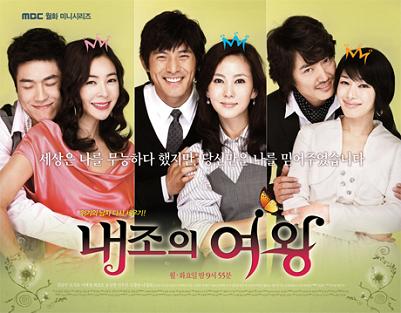 The show in question is 내조의 여왕 [nae-jo-ui yeo-wang = Queen of Housewives]. The title already tells you just how atrociously tight to every conceivable bad Korean stereotype this show manages to stay. And as usual, I don’t want to post here an in-depth plot summary, as it’s not really interesting to me to try to do so, and I don’t want to spoil it for those interested in watching it.
The show in question is 내조의 여왕 [nae-jo-ui yeo-wang = Queen of Housewives]. The title already tells you just how atrociously tight to every conceivable bad Korean stereotype this show manages to stay. And as usual, I don’t want to post here an in-depth plot summary, as it’s not really interesting to me to try to do so, and I don’t want to spoil it for those interested in watching it.
It’s quite complicated. There’s a sort of “love hexagon” going on: three married couples, A-B, C-D, and E-F. But E and C love B, D loves A, A might love D too, but is loyal to B. F despises B because B was mean to her in high school, so nobody likes F, but she’s the nerd girl I thought I should feel the most sympathy for, but she’s the villain. E is A’s boss, and C is E’s boss, but C hates his wife D, it was an arranged marriage. Etc.
There’s lots of interesting moments of self-reinvention and intentionally symbolic behavior – i.e. the characters engaging in symbolism in a sort of self-aware way. There’s a resurrection scene like that, in episode 5 or 6, I think. B digs a grave and lies down in it with husband A, and they have a deep conversation. Then they both sit up, and resolve to do their best, moving forward, despite the obstacles.
I understand that A and B are supposed to be the protagonists, but B’s cruelty early in the story line is close to unforgivable, and she seems shallow and painfully self-centered. Her husband A has a heart of gold but is clearly dumb as a rock. He dances along from one out-of-control crisis to the next, never seeing anything coming.
Lastly, my favorite website for downloading these dramas (which shall remain nameless, here), has disappeared from the internet – which is partly why I dropped my drama-watching habit. The website posted free copies of the dramas with English subtitles, but I suppose the copyright police have taken them down. Fortunately, there is now a commercial website in the US that offers subtitled Korean drama, called mvibo.com. So I’ve broken down and started paying for the privilege of having subtitles. I hesitate to recommend it, though – the ironical act of sitting about 5 blocks from the MBC studios headquarters and watching streaming MBC content from some website in America means that the streaming quality is quite poor: the tubes under the Pacific are clogged with dead fish from the radiation in Japan, maybe. I wish I could figure out how to find the subtitled content from a Korean website – but I’ve given up hope on that.
So, you’re still wondering: what’s the ajummocracy? Ajumma [아줌마] is a Korean word used to refer to a particular type of middle aged or older woman, generally in an assertive, forceful sort of aspect. The ajumma represents the matriarchal “power behind the throne” that everyone says exists behind the monolithic facade of Korean patriarchy. Like all cultural stereotypes, it has some grains of truth, of course. I have coined the term “ajummocracy” for the concept of “government by ajummas.” The idea is that Korean women do, in fact, wield considerable political power, even in deeply traditionalist and Confucian (or pseudo-Confucian – this is important but I don’t want to get into it here) contexts. But they do so by manipulating their “men” behind the scenes. Again, I’m not endorsing this – I’m talking about cultural stereotypes. And it’s an interior cultural stereotype. That’s important – ajummas refer to themselves within this context, both deprecatingly and with pride. There is, in fact, an “ajumma pride” movement in Korea. Yes – really.
Back to the drama. This drama is perhaps the best encapsulation, in rom-com format, for that cultural stereotype. Every single female character is manipulative and ambitious. Every single male character is inconstant, mercurial, and temperamental. Each man submits, at some level, to his wife in private, while in public, they play macho games that seem to be either ghost-reflections of the ajumma politics or just male ranting and venting without consequences.
I do not suffer under the delusion that this portrait of Korean society is “real.” But it’s deeply interesting to me, the same way that reading Calderon de la Barca’s or Lope de Vega’s Spanish Golden Age dramas are deeply interesting, as each so transparently display all kinds of fascinating cultural detritus.
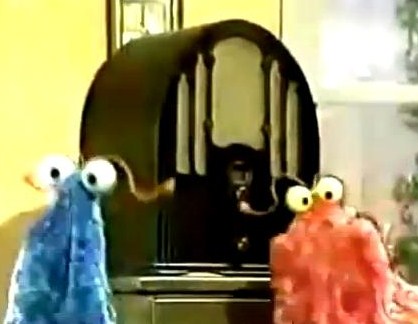 My brother posted a link to this video in facebookland. It’s worth repeating.
My brother posted a link to this video in facebookland. It’s worth repeating.
Who doesn’t remember the Sesame Street Martians with love in their hearts?
I think these aliens were my single most favorite things about Sesame Street. Their telephone routine is as clear as a bell in my mind, 40 years later (well, I’ve probably seen it since then a few times).
This little dubstep remix is appealing for its combination of that kind of nostalgia and modern trends in music. Very cool.
IamPumpking, “The Yip Yip Martians Discover Dubstep.”
Here is the original.
Sesame Street, “Martians Radio.” [UPDATE 2014-01-11: youtube embeds were broken – I’ve replaced them.]
“Happy happy happy happy.”
A poem by Kim Gwang-seop:
개성 빈천한 묏골에서 하나의 돌맹이로 태어 나서커 다란 바위가 되지 못할지라도 또한 하나의 시내로서 흘러서 넓은 바다에 이르지 못할지라도 그대는 무한에 비상하는 순간을 가지라
My feeble effort at translation, with lots of doubts and confusions and caveats:
Individuality from poor dead bones born and raised as a lone pebble unable to become the great rock also flowing as a lone stream unable to arrive at the wide sea you hold an extraordinary moment to reach infinity
A more professional translation, by someone who goes by the name “Doc Rock” online (but who is apparently a PhD in Korean Lit):
Individuality Though from an impoverished mountain valley, Born as a pebble Never to be a great boulder Or Flowing like a stream Never to be wide as a sea You will have moments to soar limitlessly
Why am I attempting this kind of thing, when I still can’t put together a coherent sentence most of the time? I just feel like doing it, I guess.
Jeffrey Goldberg (of The Atlantic’s Goldblog fame) Palinesquely channels Longfellow on the subject of Paul Revere. Brilliant. If you’ve been following the Palin-on-Paul-Revere controversy, it’s quite hilarious. An excerpt:
 LISTEN, my children, and you shall hear
LISTEN, my children, and you shall hear
Of the early evening ride of Paul Revere,
On the twentieth, or twenty-first, of May, or possibly June, in Seventy-six, or maybe Seventy-seven;
Hardly a man is now alive
Who refudiates that famous day and year.
…
Then I will ride a Harley, that I was pulling on a trailer behind the bus, and spread the alarm,
Man, I love the smell of that emissions
That smell is freedom, carried by horse,
Through every Middlesex village and farm,
Not horse emissions, chopper emissions.
But horse emissions are very patriotic.
And I will warn the British that the British are coming.
Which should confuse them very much.
I have just recently discovered the musical oeuvre of Bill Callahan (also formerly performing under the name Smog). Recently released album: Apocalypse. Track: “Drover.”
Lyrics (poetry).
The real people went away
But I’ll find a better word, someday
Leaving only me and my dreams
My cattle and a resonator
I drove all the beast down right under your nose
The lumbering footloose power
The bull and the rose
Don’t touch them don’t try to hurt them
My cattle
I drove them by the crops and thought the crops were lost
I consoled myself with rudimentary thoughts
And I set my watch against the city clock
It was way off
Yeah one thing about this wild, wild country
It takes a strong, strong
It breaks a strong, strong mind
Yeah one thing about this wild, wild country
It takes a strong, strong
It breaks a strong, strong mind
And anything less, anything less
Makes me feel like I’m wasting my time
But the pain and frustration, is not mine
It belongs to the cattle, through the valley
And when my cattle turns on me
I was knocked back flat
I was knocked out cold for one clack of the train track
Then I rose a colossal hand buried, buried in sand
I rose like a drover
For I am in the end a drover
A drover by trade
When my cattle turns on me
I am a drover, double fold
My cattle bears it all away for me and everyone
One, one, one, one, one, one …
Yeah one thing about this wild, wild country
It takes a strong, strong
It breaks a strong, strong mind
And anything less, anything less
Makes me feel like I’m wasting my time
The song:
Bill Callahan, “Drover.”
I saw this video yesterday. The pathos is so strong, for me, I almost cried. It's from a kindergarten classroom teacher in a neighborhood south of Monterrey, Mexico.
It's kind of hard to tell what's going on in the video. Apparently during the whole whole time, there is a major gun battle raging outside the window of the classroom, between rival gangs. The teacher is having the children lie on the floor and keeping them calm, using long-practiced safety drills. She's running her video camera the whole time, as she talks to them and even tries to lead the kids in a song, and uses the plot of the song to keep them lying flat on the floor (to catch the chocolate drops raining down). She keeps saying "no pasa nada" [nothing is happening], to reassure them.
This short animated movie made a huge impression on me when I saw it, as a child, on the big screen, at the Minor Theater in Arcata. I’m guessing it was 1972 or 73, maybe. I never forgot it, although I forgot (or never knew) its title. And the other day, surfing the internet, I found it. It’s still awesome.
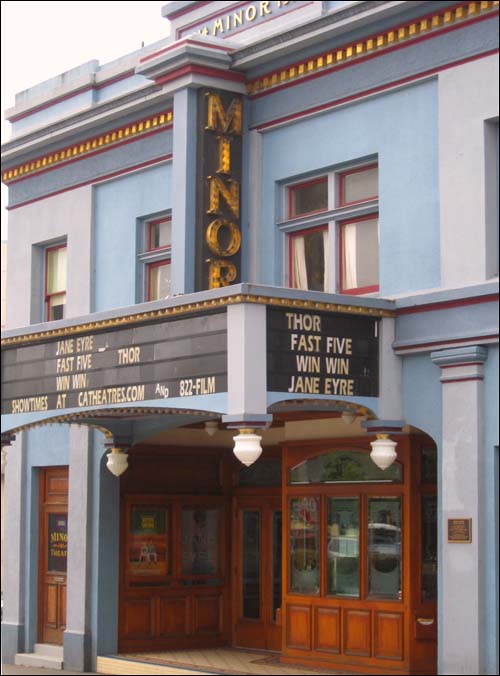 I remember we used to go to movies at the Minor and then go to a restaurant called the Epicurean afterward, where I was strangely addicted to these peculiar vaguely counter-cultural sandwiches that included chopped lettuce, cream cheese, and olives.
I remember we used to go to movies at the Minor and then go to a restaurant called the Epicurean afterward, where I was strangely addicted to these peculiar vaguely counter-cultural sandwiches that included chopped lettuce, cream cheese, and olives.
Okay. Maybe I’m strange. But I laughed for a long time when I saw this picture at My Modern Met.
Not unrelated:
“I bow in repentance of any misdeeds lived and discerning this world good or bad.”
This is #53 out of a series of 108 daily Buddhist affirmations that I am attempting to translate with my hands tied behind my back (well not really that, but I’m deliberately not seeking out translations on the internet, using only dictionary and grammar).
…
51. 이 세상을 많고 적음으로 분별하며 살아온 죄를 참회하며 절합니다.
“I bow in repentance of any misdeeds lived and discerning this world, more or less.”
52. 이 세상을 높고 낮음으로 분별하며 살아온 죄를 참회하며 절합니다.
“I bow in repentance of any misdeeds lived and discerning this world high or low.”
53. 이 세상을 좋고 나쁨으로 분별하며 살아온 죄를 참회하며 절합니다.
I would read this fifty-third affirmation as: “I bow in repentance of any misdeeds lived and discerning this world good or bad.”
Maybe it should be “through good or bad.” I felt tired, last night, just looking at my new schedule. I have a lot of preparing to do in order to be able to approach all my classes confidently. I’m especially hopeful to do a good job with the single high-level debate class Curt asked me to put together – since it’s the one spot in the schedule where he’s decided to use me as an innovator as opposed to someone just going along with what’s already in place. I really liked the LBridge debate program, so I suppose that forms the basis of what I want to do, but I will have to make it “my own.”
Unrelatedly, another miscellany: my student Yewon misses me. I miss her too – she was one of the most awesome fourth-graders ever. Here’s her email.
 Lastly… maybe unrelatedly, again… here is a candid picture of Han and Chewbacca, at right, discerning the world through good or bad – legostyle.
Lastly… maybe unrelatedly, again… here is a candid picture of Han and Chewbacca, at right, discerning the world through good or bad – legostyle.